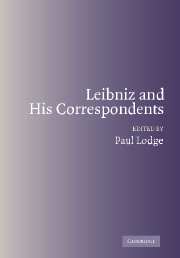Book contents
- Frontmatter
- Contents
- Contributors
- Abbreviations
- Acknowledgments
- 1 Introduction
- 2 Leibniz and His Master: The Correspondence with Jakob Thomasius
- 3 A Philosophical Apprenticeship: Leibniz's Correspondence with the Secretary of the Royal Society, Henry Oldenburg
- 4 The Leibniz–Foucher Alliance and Its Philosophical Bases
- 5 Leibniz to Arnauld: Platonic and Aristotelian Themes on Matter and Corporeal Substance
- 6 Leibniz and Fardella: Body, Substance, and Idealism
- 7 Leibniz's Exchange with the Jesuits in China
- 8 Leibniz's Close Encounter with Cartesianism in the Correspondence with De Volder
- 9 “All the time and everywhere everything's the same as here”: The Principle of Uniformity in the Correspondence Between Leibniz and Lady Masham
- 10 Idealism Declined: Leibniz and Christian Wolff
- 11 On Substance and Relations in Leibniz's Correspondence with Des Bosses
- 12 “[…] et je serai tousjours la même pour vous”: Personal, Political, and Philosophical Dimensions of the Leibniz–Caroline Correspondence
- References
- Index
1 - Introduction
Published online by Cambridge University Press: 02 September 2009
- Frontmatter
- Contents
- Contributors
- Abbreviations
- Acknowledgments
- 1 Introduction
- 2 Leibniz and His Master: The Correspondence with Jakob Thomasius
- 3 A Philosophical Apprenticeship: Leibniz's Correspondence with the Secretary of the Royal Society, Henry Oldenburg
- 4 The Leibniz–Foucher Alliance and Its Philosophical Bases
- 5 Leibniz to Arnauld: Platonic and Aristotelian Themes on Matter and Corporeal Substance
- 6 Leibniz and Fardella: Body, Substance, and Idealism
- 7 Leibniz's Exchange with the Jesuits in China
- 8 Leibniz's Close Encounter with Cartesianism in the Correspondence with De Volder
- 9 “All the time and everywhere everything's the same as here”: The Principle of Uniformity in the Correspondence Between Leibniz and Lady Masham
- 10 Idealism Declined: Leibniz and Christian Wolff
- 11 On Substance and Relations in Leibniz's Correspondence with Des Bosses
- 12 “[…] et je serai tousjours la même pour vous”: Personal, Political, and Philosophical Dimensions of the Leibniz–Caroline Correspondence
- References
- Index
Summary
Leibniz never wrote a magnum opus. His books were generally limited in scope (e.g., the Dynamics and Theodicy), and the one exception (the New Essays) is shaped as much by Leibniz's desire to show the inadequacies in Locke's views as by his desire to provide an exposition of his own philosophy. Where Leibniz did present surveys of his philosophy, these took the form of essays which were published in the journals of the day or which lay hidden from public view until after his death. And these essays, even the most famous ones such as the Discourse on Metaphysics, the New System, and the Monadology, provide little more than brief, and often exasperating, sketches. Nowhere do we find the likes of Descartes's Meditations, Spinoza's Ethics, or Locke's Essay.
The task of understanding Leibniz's philosophy would be a difficult one, to say the least, were it not for an additional fact. For Leibniz was unlike his contemporaries in another way, namely in the extent to which he was willing to engage in philosophical discussion through the medium of correspondence. To be sure, students of other major figures have letters available to them. For example, eighty-four letters between Spinoza and his correspondents have survived – although almost half of these were written to Spinoza rather than by him. And Descartes left a larger body of correspondence consisting of just over six hundred letters, around five hundred of which were written by Descartes himself.
- Type
- Chapter
- Information
- Leibniz and his Correspondents , pp. 1 - 9Publisher: Cambridge University PressPrint publication year: 2004

